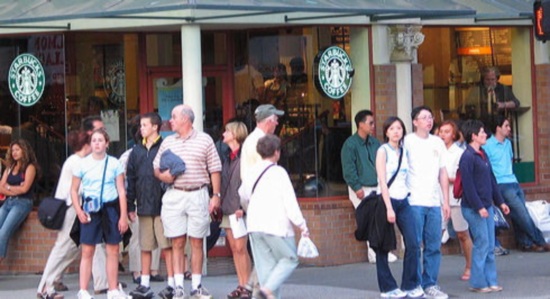According to Reuters, Starbucks has paid a mere £8.6 million in UK taxes on a reported £3 billion in sales in the UK since 1998, when it opened its first UK coffee shop, despite having opened 735 outlets subsequently.

The revelation led to calls by MPs and pressure groups for an investigation into the company’s tax affairs, which one MP called ‘disgraceful.’
In the last three years, the company paid no tax on its UK earnings after recording yearly losses in company accounts, even though US executives of the Seattle company claimed in telephone calls with financiers, copies of which have been seen by the news agency, that the UK business was lucrative.
The inconsistencies highlight legal tax-avoidance strategies used by international companies by loading UK divisions with debts from other parts of the business based in countries with lower tax thresholds.
In 2007, Martin Coles, the chief operating officer, told forecasters in a fourth quarter results presentation that the UK unit’s revenues were funding Starbucks’ growth in overseas markets. Peter Bocian, the chief finance officer at the time, added that the UK division enjoyed operating profit margins of nearly 15 per cent that year, equal to nearly £50m in revenue.
Accounts filed with Companies House, which must be a honest reflection of the company, according to HM Revenue & Customs (HMRC), showed a tenth successive yearly loss.
A year later, after filing a £26 million loss in the UK, Howard Schultz, Starbucks’ chief executive, told financiers the business here was so successful he planned to apply the lessons to the company’s main market in the US.
Chief financial officer, Troy Alstead, called the UK side of the business “profitable” in 2009 after accounts revealed a £52m loss. Last year, the president of Starbucks international division, John Culver said: “We are very pleased with the performance in the UK.” Accounts announced a £33m loss.
Michael Meacher, the Labour MP for Royton and Oldham West, who has campaigned tirelessly against companies that use tax evasion systems, said: “HMRC should be having a look at this, especially since they keep saying there should be a crackdown. This has been going on for years and there are many companies involved.”
Meacher further added: “The fact they have paid 0.3 per cent tax on their turnover is utterly scandalous. If they didn’t think they could get away with it, they wouldn’t dare do it.”
HMRC said: “For legal reasons, we cannot comment on the tax affairs of individual businesses, but we make sure that multinationals pay the right tax to the UK in accordance with UK tax law.
“Our tax rules combat tax avoidance and we employ specialist tax professionals to ensure that multinationals play by the rules.”
Anna Walker, a spokesperson for UK Uncut, which attempts to focus attention on companies that fail to pay their fair share of tax, called on the government to change the existing law to end what she called “unfair and unjust behaviour”, adding that the group had Starbucks “in its sights”.
She said: “The government must take action so that this country has a fair tax system ensuring that hugely profitable companies like Starbucks pay the right amount of tax.”
There is no suggestion that the coffee house has broken the law and the company’s worldwide tax rate was 31 per cent last year, compared with an average of 18.5 per cent for international business. Nevertheless, it paid an average of 13 per cent on overseas earnings, one of the lowest rates in the consumer goods sector.
Starbucks said: “We have paid and will continue to pay our fair share of taxes in full compliance with all UK tax laws, as we always have. There has been no suggestion by any authority that we are anything but compliant and good taxpayers.”
Do you run an independent coffee shop? Do you think you are facing unfair competition from major chains like Starbucks? Share your thoughts with us below.
Previous Post
High Street Boost Indicates End of Recession is Near